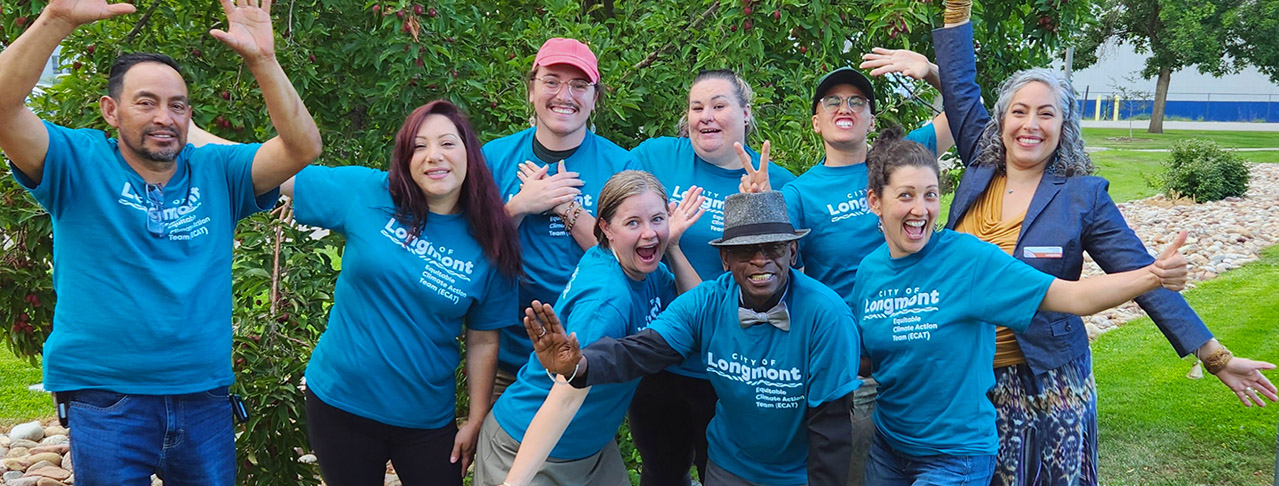Equitable Climate Action Team

The Equitable Climate Action Team (ECAT) is a group of volunteer community members who assist City staff in implementing equitable climate action through community education, outreach and the evaluation of City programs. ECAT’s definition of equitable climate action is: local policy and personal habits that reduce climate pollution and increase community resilience in ways that do no harm, and that support all communities according to their needs. They serve as a direct line of communication between City staff and community with their 3 main tasks: Learn, Engage, Educate. Check out our Longmont Indicator’s page for more recent highlights of ECAT’s work!
The City is always looking for feedback on climate equity issues that impact our community and invites all Longmont residents to share their experiences, concerns and ideas for possible solutions. Contact the Sustainability Office for more information. To learn more about how ECAT’s volunteer service relates to the Sustainability Plan, visit the Sustainability homepage.
Current Members of ECAT reflect diverse perspectives and experiences, but all are connected by motivations to address climate equity issues related to air pollution, clean water access, waste reduction and health effects of climate change.
The passing of the Climate Emergency Resolution impacted the Just Transition Plan (JTP) that was in development since late 2018. The original aim of the JTP was to create an equitable transition to 100% renewable electricity through inclusive engagement and identifying actions to minimize the impact of the transition on underserved and underrepresented populations. The Climate Emergency Resolution created the opportunity to expand the focus of the JTP to include broader equitable climate action for frontline communities most impacted by climate change. Instead of creating a separate plan, the final equitable climate action recommendations were integrated into the Climate Action Recommendations Report.
The development of the JTP has occurred in two phases:
- Learn Where We Are Today
- To learn about the current level of access to electrical energy services and programs, City staff reviewed national and local reports to identify potential lack of access to electric energy services and the interconnection between energy and community health and other basic needs. Next, to better understand low-to-medium income residents, in the summer of 2019 the City distributed a survey to 562 residents and held ten listening sessions.
- Develop Program Recommendations
- The development of program recommendations started in the Fall of 2019 by holding four Environment & Us Workshops to increase awareness and understanding of the importance of integrating equity into environmental actions and policy.
- On October 8, 2019, Longmont City Council passed the Climate Emergency Resolution. The final equitable climate action program recommendations were created by a Just Transition Plan (JTP) Committee, as detailed in the JTP Committee Equity Recommendations section of the Climate Action Recommendations Report.
2020
- ECAT contributed equity recommendations in the Climate Action Recommendation Report that can be applied to any climate action program to help expand inclusion and participation in City programs. Since then, ECAT’s recommendations have been developed into an Equity Checklist to orient City staff and a Climate Equity Discussion Guide, an analysis tool used to review new City programs
2021
- In collaboration with Sustainable Resilient Longmont, ECAT co-hosted the “We’re in This Together: Equitable Climate Action in Longmont,” on Earth Day at the Longmont Museum. The panel focused on the importance of climate justice and was the first multilingual broadcasted panel at the Longmont Museum. Watch the videos in English and in Spanish.
- Members learned about:
- Equity, at two workshops in collaboration with the Boulder County Climate Justice Collaborative.
- Reviewed eight climate action projects, including air quality, waste & electrification; and gave meaningful contributions to the drafting of Beneficial Building Electrification Plan and Universal Recycling Ordinance.
2022
- A Bilingual Equity and Engagement specialist was hired to better coordinate ECAT’s important work. Since then, more equity guidelines have been added to ECAT’s operations, membership was expanded to include more diverse community representation and volunteer presence at City supported community events. Members learned about:
- Their role in local government and, communication skills.
- Equity and language access guidelines for their internal governing documents.
- Reviewed the following six City programs: Beneficial Building Electrification Plan, Zero Waste Resolution, Climate Risk Map, Sugar Mill, E-Bike Pilot Program, Water Efficiency Master Plan.
- Volunteered at 12 events educating community on city climate action programs.
2023
- ECAT membership grew more, received branded T-shirts and a banner to help them be recognized as volunteer City leaders at community events. Members learned about:
- The intersection of equity and sustainability through presentations and field trips focused on community cohesion and regenerative Traditional Ecological Knowledge (TEK) practices.
- Reviewed and gave feedback on eight new City climate action projects.
- Volunteered at 14 City events educating community on sustainability, resilience and climate action.
2024
- ECAT is learning about the importance of Community Cohesion and preparedness for Natural Disasters & Emergencies. ECAT now has five new members from Longmont’s frontline communities and are committed to their goal to elevate voices most impacted by climate change. Other activities that cover their three main tasks (Learn, Engage, Educate):
- Reviewed eight City climate action projects, including new plans to expand Solar Energy and Transportation Mobility Plan.
- Volunteered at fifteen City events by the end of the year educating community on sustainability and climate action.
